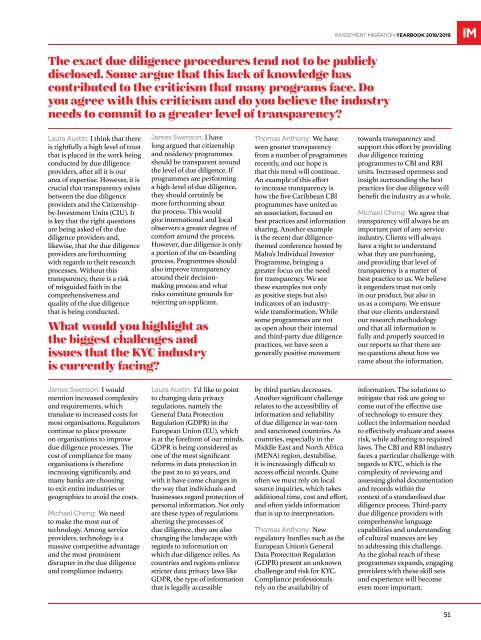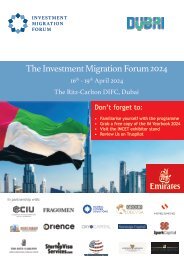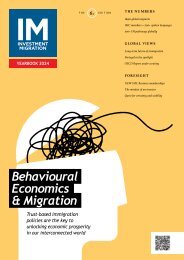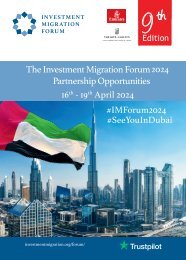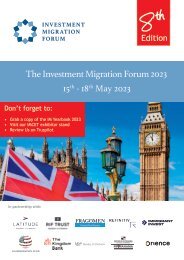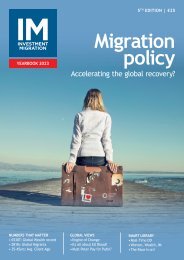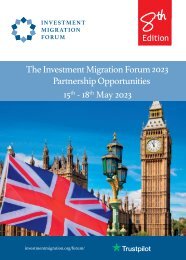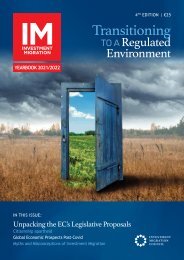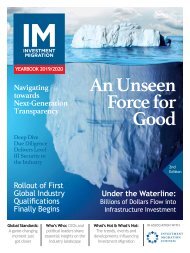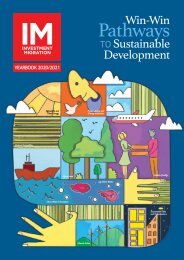IM Yearbook 2018/19
Created out of the need for a global, credible, “go-to” industry publication, the IM Yearbook offers valuable access to a prime target audience of your partners, your peers, and the foremost referral network leading to the world’s most influential RCbI programmes: senior level representatives of the global migration industry, academics, migration agents, migration law firms, wealth managers, UHNWI’s, government representatives, and international organisations involved in migration and citizenship-by-investment.
Created out of the need for a global, credible, “go-to” industry publication, the IM Yearbook offers valuable access to a prime target audience of your partners, your peers, and the foremost referral network leading to the world’s most influential RCbI programmes: senior level representatives of the global migration industry, academics, migration agents, migration law firms, wealth managers, UHNWI’s, government representatives, and international organisations involved in migration and citizenship-by-investment.
- No tags were found...
Create successful ePaper yourself
Turn your PDF publications into a flip-book with our unique Google optimized e-Paper software.
INVESTMENT MIGRATION YEARBOOK <strong>2018</strong>/20<strong>19</strong><br />
<strong>IM</strong><br />
The exact due diligence procedures tend not to be publicly<br />
disclosed. Some argue that this lack of knowledge has<br />
contributed to the criticism that many programs face. Do<br />
you agree with this criticism and do you believe the industry<br />
needs to commit to a greater level of transparency?<br />
Laura Austin: I think that there<br />
is rightfully a high level of trust<br />
that is placed in the work being<br />
conducted by due diligence<br />
providers, after all it is our<br />
area of expertise. However, it is<br />
crucial that transparency exists<br />
between the due diligence<br />
providers and the Citizenshipby-Investment<br />
Units (CIU). It<br />
is key that the right questions<br />
are being asked of the due<br />
diligence providers and,<br />
likewise, that the due diligence<br />
providers are forthcoming<br />
with regards to their research<br />
processes. Without this<br />
transparency, there is a risk<br />
of misguided faith in the<br />
comprehensiveness and<br />
quality of the due diligence<br />
that is being conducted.<br />
James Swenson: I have<br />
long argued that citizenship<br />
and residency programmes<br />
should be transparent around<br />
the level of due diligence. If<br />
programmes are performing<br />
a high-level of due diligence,<br />
they should certainly be<br />
more forthcoming about<br />
the process. This would<br />
give international and local<br />
observers a greater degree of<br />
comfort around the process.<br />
However, due diligence is only<br />
a portion of the on-boarding<br />
process. Programmes should<br />
also improve transparency<br />
around their decisionmaking<br />
process and what<br />
risks constitute grounds for<br />
rejecting an applicant.<br />
What would you highlight as<br />
the biggest challenges and<br />
issues that the KYC industry<br />
is currently facing?<br />
Thomas Anthony: We have<br />
seen greater transparency<br />
from a number of programmes<br />
recently, and our hope is<br />
that this trend will continue.<br />
An example of this effort<br />
to increase transparency is<br />
how the five Caribbean CbI<br />
programmes have united as<br />
an association, focused on<br />
best practices and information<br />
sharing. Another example<br />
is the recent due diligencethemed<br />
conference hosted by<br />
Malta’s Individual Investor<br />
Programme, bringing a<br />
greater focus on the need<br />
for transparency. We see<br />
these examples not only<br />
as positive steps but also<br />
indicators of an industrywide<br />
transformation. While<br />
some programmes are not<br />
as open about their internal<br />
and third-party due diligence<br />
practices, we have seen a<br />
generally positive movement<br />
towards transparency and<br />
support this effort by providing<br />
due diligence training<br />
programmes to CBI and RBI<br />
units. Increased openness and<br />
insight surrounding the best<br />
practices for due diligence will<br />
benefit the industry as a whole.<br />
Michael Cheng: We agree that<br />
transparency will always be an<br />
important part of any service<br />
industry. Clients will always<br />
have a right to understand<br />
what they are purchasing,<br />
and providing that level of<br />
transparency is a matter of<br />
best practice to us. We believe<br />
it engenders trust not only<br />
in our product, but also in<br />
us as a company. We ensure<br />
that our clients understand<br />
our research methodology<br />
and that all information is<br />
fully and properly sourced in<br />
our reports so that there are<br />
no questions about how we<br />
came about the information.<br />
James Swenson: I would<br />
mention increased complexity<br />
and requirements, which<br />
translate to increased costs for<br />
most organisations. Regulators<br />
continue to place pressure<br />
on organisations to improve<br />
due diligence processes. The<br />
cost of compliance for many<br />
organisations is therefore<br />
increasing significantly, and<br />
many banks are choosing<br />
to exit entire industries or<br />
geographies to avoid the costs.<br />
Michael Cheng: We need<br />
to make the most out of<br />
technology. Among service<br />
providers, technology is a<br />
massive competitive advantage<br />
and the most prominent<br />
disrupter in the due diligence<br />
and compliance industry.<br />
Laura Austin: I’d like to point<br />
to changing data privacy<br />
regulations, namely the<br />
General Data Protection<br />
Regulation (GDPR) in the<br />
European Union (EU), which<br />
is at the forefront of our minds.<br />
GDPR is being considered as<br />
one of the most significant<br />
reforms in data protection in<br />
the past 20 to 30 years, and<br />
with it have come changes in<br />
the way that individuals and<br />
businesses regard protection of<br />
personal information. Not only<br />
are these types of regulations<br />
altering the processes of<br />
due diligence, they are also<br />
changing the landscape with<br />
regards to information on<br />
which due diligence relies. As<br />
countries and regions enforce<br />
stricter data privacy laws like<br />
GDPR, the type of information<br />
that is legally accessible<br />
by third parties decreases.<br />
Another significant challenge<br />
relates to the accessibility of<br />
information and reliability<br />
of due diligence in war-torn<br />
and sanctioned countries. As<br />
countries, especially in the<br />
Middle East and North Africa<br />
(MENA) region, destabilise,<br />
it is increasingly difficult to<br />
access official records. Quite<br />
often we must rely on local<br />
source inquiries, which takes<br />
additional time, cost and effort,<br />
and often yields information<br />
that is up to interpretation.<br />
Thomas Anthony: New<br />
regulatory hurdles such as the<br />
European Union’s General<br />
Data Protection Regulation<br />
(GDPR) present an unknown<br />
challenge and risk for KYC.<br />
Compliance professionals<br />
rely on the availability of<br />
information. The solutions to<br />
mitigate that risk are going to<br />
come out of the effective use<br />
of technology to ensure they<br />
collect the information needed<br />
to effectively evaluate and assess<br />
risk, while adhering to required<br />
laws. The CBI and RBI industry<br />
faces a particular challenge with<br />
regards to KYC, which is the<br />
complexity of reviewing and<br />
assessing global documentation<br />
and records within the<br />
context of a standardised due<br />
diligence process. Third-party<br />
due diligence providers with<br />
comprehensive language<br />
capabilities and understanding<br />
of cultural nuances are key<br />
to addressing this challenge.<br />
As the global reach of these<br />
programmes expands, engaging<br />
providers with these skill sets<br />
and experience will become<br />
even more important.<br />
51


